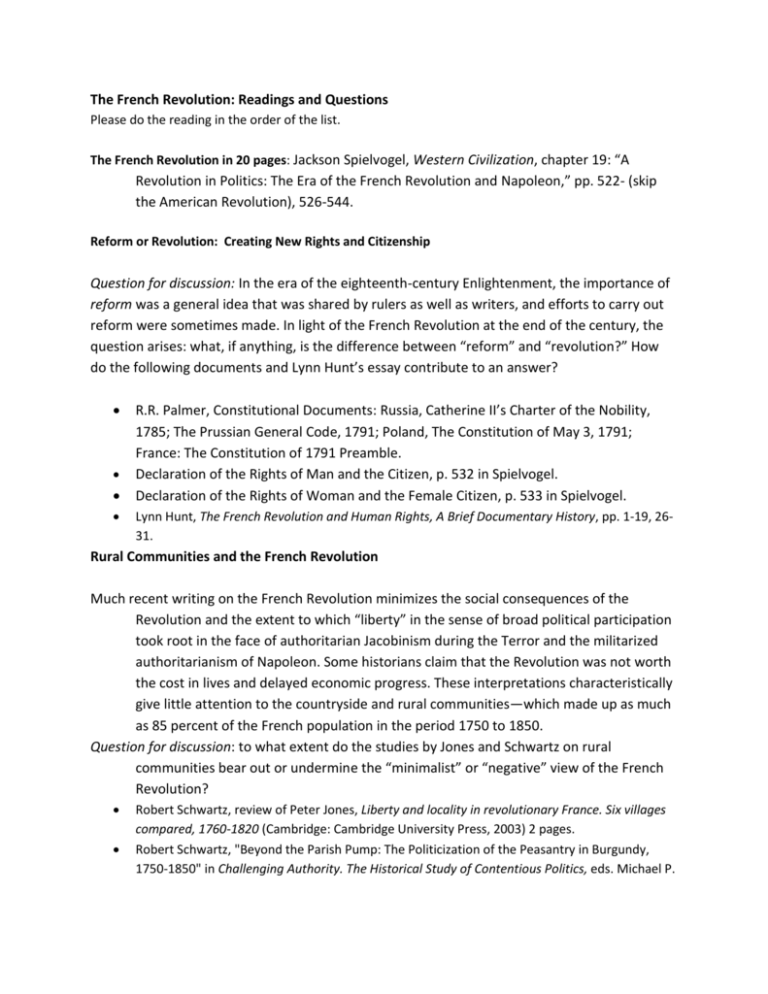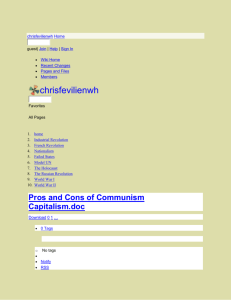
The French Revolution: Readings and Questions
Please do the reading in the order of the list.
The French Revolution in 20 pages: Jackson Spielvogel, Western Civilization, chapter 19: “A
Revolution in Politics: The Era of the French Revolution and Napoleon,” pp. 522- (skip
the American Revolution), 526-544.
Reform or Revolution: Creating New Rights and Citizenship
Question for discussion: In the era of the eighteenth-century Enlightenment, the importance of
reform was a general idea that was shared by rulers as well as writers, and efforts to carry out
reform were sometimes made. In light of the French Revolution at the end of the century, the
question arises: what, if anything, is the difference between “reform” and “revolution?” How
do the following documents and Lynn Hunt’s essay contribute to an answer?
R.R. Palmer, Constitutional Documents: Russia, Catherine II’s Charter of the Nobility,
1785; The Prussian General Code, 1791; Poland, The Constitution of May 3, 1791;
France: The Constitution of 1791 Preamble.
Declaration of the Rights of Man and the Citizen, p. 532 in Spielvogel.
Declaration of the Rights of Woman and the Female Citizen, p. 533 in Spielvogel.
Lynn Hunt, The French Revolution and Human Rights, A Brief Documentary History, pp. 1-19, 2631.
Rural Communities and the French Revolution
Much recent writing on the French Revolution minimizes the social consequences of the
Revolution and the extent to which “liberty” in the sense of broad political participation
took root in the face of authoritarian Jacobinism during the Terror and the militarized
authoritarianism of Napoleon. Some historians claim that the Revolution was not worth
the cost in lives and delayed economic progress. These interpretations characteristically
give little attention to the countryside and rural communities—which made up as much
as 85 percent of the French population in the period 1750 to 1850.
Question for discussion: to what extent do the studies by Jones and Schwartz on rural
communities bear out or undermine the “minimalist” or “negative” view of the French
Revolution?
Robert Schwartz, review of Peter Jones, Liberty and locality in revolutionary France. Six villages
compared, 1760-1820 (Cambridge: Cambridge University Press, 2003) 2 pages.
Robert Schwartz, "Beyond the Parish Pump: The Politicization of the Peasantry in Burgundy,
1750-1850" in Challenging Authority. The Historical Study of Contentious Politics, eds. Michael P.
Hanagan, Leslie Page Moch, and Wayne TeBrake (Minneapolis: University of Minnesota Press,
1998): 120-35.
Women and Revolution
Questions: frame your own questions for discussion.
Alexandra Kollontai, “Women Fighters in the Days of the Great October Revolution,”(November
1927—10th anniversary of the Bolshevik Revolution): 2 pages.
Darlene Gay Levy, Harriet Branson Applewhite, and Mary Durham Johnson, Women in Revolutionary
Paris, 1789-1795, introduction and conclusion: 3-12; 309-312.
Optional documents: “A Call for the End of Sexual Discrimination,” pp. 75-8; “An Account of a
Session of the Society of Revolutionary Republican Women,” pp. 166-172
The Women’s March to Versailles, October 6-7, 1789, pp. 49-55 “A Letter from Versailles; Testimony in
Paris, December 24, 1789 by Maitre Gérard-Henri de Blois; March 5, 1790 by Jeanne Martin;
April 23, 1790 by Françoise Rolin. [Sample at least a couple of these documents].
READ ONE, skim others. Divide these readings into three groups by first letter of last name: A-L
(Desanti), M-S (Scott), T-Z (Hunt).
Dominique Desanti, “Flora Tristan: Rebel Daughter of the Revolution,” in Rebel Daughters.
Women and the French Revolution, eds. Sara E. Melzer and Leslie W. Rabine, (New York:
Oxford University Press, 1992): 273 ff.
Joan Wallach Scott, “French Feminists and the Rights of “Man”: Olympe de Gouge’s
Declarations,” The French Revolution. The Essential Readings, ed. Ronald Schecter
(London: Blackwell, 2001): 210-235
Lynn Hunt, “The Band of Brothers,” Ibid., pp. 236-262.
Short presentations: (each group share these responsibilities)
1.
2.
3.
4.
State the main point/conclusion/argument [a paragraph]
Describe two examples of evidence supporting the argument [paragraph each]
Most interesting thing [paragraph]
Connection with other reading this week or others. [paragraph]







